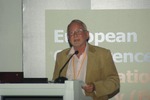European conference on Information literacy (ECIL) , Istanbul, Turkey 22-25 October, 2013
 Wednesday, October 30, 2013 at 5:33PM
Wednesday, October 30, 2013 at 5:33PM I got back on Monday after attending the ECIL Conference which was pretty hectic followed by three days of equally hectic sightseeing. The conference - see website: http://www.ecil2013.org/index.php/home was held at the Military Museum near Taksim Square although all seemed quiet there. It was a busy three days – about 8.30 am to 6-8 pm most days and we were all pretty tired by the end of it. There were 367 delegates from 59 countries. There were about 235 presentations including keynotes. I was on the Standing and Programme Committees which meant I had to evaluate submissions and also chair a conference session. I also gave an invited presentation.
The conference was mainly organised by Serap Kurbanoglu, a professor at Hacateppe University in Ankara, and Sonja Spiranec from the University of Zagreb in Croatia. I think our Community of Practice did pretty well to have three speakers: Bill Johnston (presenting with Sheila Webber), Marion Kelt and me. Just about everyone who is anybody in the IL world was there, including Christi Paul Zurkowski ECIL 2013 (Photo courtesy of ECIL Serap Kurbanoglu)y ne Bruce, Annemaree Lloyd, whose work I particularly admire, and most notably Paul Zurkowski who coined the term information literacy in 1974 and is the father of the movement. He gave a memorable keynote.
Paul Zurkowski ECIL 2013 (Photo courtesy of ECIL Serap Kurbanoglu)y ne Bruce, Annemaree Lloyd, whose work I particularly admire, and most notably Paul Zurkowski who coined the term information literacy in 1974 and is the father of the movement. He gave a memorable keynote.
For fairly detailed reporting on the presentations she attended have a look at Sheila Webber’s blog: http://information-literacy.blogspot.co.uk/ . This includes the session I chaired on the Thursday afternoon.
Bill and Sheila gave a most interesting presentation on the Tuesda y afternoon - Information literate lives in the 21st century – which outlined a curriculum for an information literate lifecourse, the information needs of ordinary people in other words, which seems to me to be a model we could follow.
 John Crawford speaking at ECIL ( Photo courtesy of ECIL Serap Kurbanoglu)My presentation on the Wednesday afternoon – Are national information literacy policies possible? went OK. T he presentation was based partly on my experience of directing the Scottish Information Literacy Project and the wider lessons which can be learned from it and partly on reading about other countries. My aims in presenting were twofold:
John Crawford speaking at ECIL ( Photo courtesy of ECIL Serap Kurbanoglu)My presentation on the Wednesday afternoon – Are national information literacy policies possible? went OK. T he presentation was based partly on my experience of directing the Scottish Information Literacy Project and the wider lessons which can be learned from it and partly on reading about other countries. My aims in presenting were twofold:
- To find out if the Scottish experience resonated with delegates from other countries
- To find out if my ideas about national literacy strategies were applicable in other countries.
The answer to both these questions proved to be yes. My presentation generated quite a few questions.
I had scarcely sat down after I had finished when a member of the conference team approached me and asked if I was free for a meeting with Paul Zurkowski who congratulated me on the presentation and discussed issues of common interest. He hopes to travel to Ireland and possibly Scotland and it would be great if he could come here. Other people who talked to me afterwards included Maria Carme Torres Calvo who, although based in Bergen in Norway, is a Catalan and thought the Scottish and Catalan situations similar. A Mexican delegate also thought my ideas relevant to his country.
I also took the opportunity to give the book a plug: Crawford, John C and Irving, Christine. Information Literacy and Lifelong Learning: Policy issues, the workplace, health and public libraries. Chandos, 2013. so hopefully it will help sales. Paul Zurkowski said he would get a copy.
Marion was on at 8.30 am on the Thursday morning and unfortunately I slept in and missed it but hopefully she will tell you all about it herself.
The session I chaired on the Thursday afternoon was attended and blogged by Sheila Webber and her blog gives all the details. There were six papers and the session lasted three hours and included Annemaree Lloyd with whose work on IL in the workplace I am familiar and also Katarzyna Materska from the University of Warsaw who also spoke about IL in the workplace. I had not come across her before and found her work interesting. Much of her work is in Polish unfortunately (see Google Scholar http://scholar.google.co.uk/scholar?hl=en&q=Katarzyna+Materska+&btnG=&as_sdt=1%2C5&as_sdtp= ). The final session speaker was Christine Yates on health literacy.
The conference was a great success and well organised and Serap and Sonia deserve great credit for all the work they did. Amazingly enough they are going to do it all again and are planning another conference in Dubrovnik in October 2014. Hopefully it will be equally successful.
John Crawford
